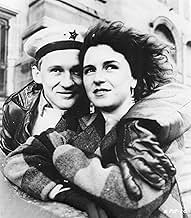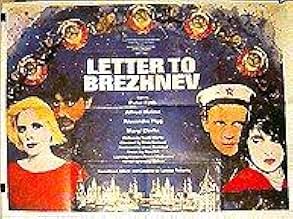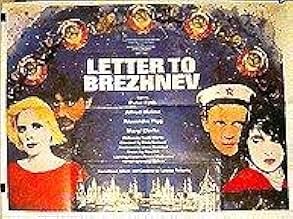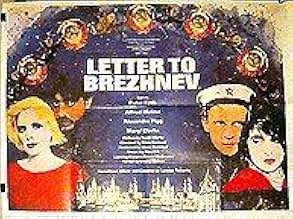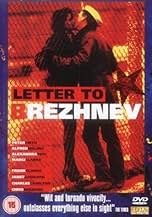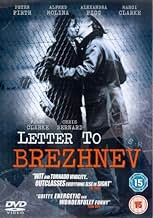ÉVALUATION IMDb
6,7/10
1,7 k
MA NOTE
Ajouter une intrigue dans votre langueTwo Soviet sailors meet Liverpool girls during a shore leave. Peter falls for Elaine but must leave with his ship. Missing him, she writes to Brezhnev hoping to reunite.Two Soviet sailors meet Liverpool girls during a shore leave. Peter falls for Elaine but must leave with his ship. Missing him, she writes to Brezhnev hoping to reunite.Two Soviet sailors meet Liverpool girls during a shore leave. Peter falls for Elaine but must leave with his ship. Missing him, she writes to Brezhnev hoping to reunite.
- Nominé pour le prix 1 BAFTA Award
- 2 victoires et 1 nomination au total
Tracy Marshak-Nash
- Tracy
- (as Tracy Lea)
Avis en vedette
Margi Clarke is on smashing form here as the gobby Liverpudlian lass ("Teresa") who, together with her pal "Elaine" (a strong performance from Alexandra Pigg), is out on the town hoping to fleece some well heeled punters. They are doing ok on that front - even if they have to do quite a bit of running - when they encounter "Peter" (Peter Firth) and his mate "Andrei" (Alfred Molina) who have a night of shore leave from their Soviet ship. "Teresa" and "Peter" immediately click and after their few hours together, sans sex, they declare their undying love and determination to meet again. How might this happen, though? They are thousands of miles apart and she hasn't tuppence to rub together. Her plan: write to President Brezhnev. His reply: an invitation to visit and a plane ticket. Can she go, will she go, is it all just a daft pipe dream? Whether they do or not is actually quite incidental to the story. It's a whirlwind romance presented to us in a whirlwind fashion that just oozes character. Firth isn't the most versatile of actors, he is a bit one-gear I think, but here that serves as the perfect foil for the brassy, sassy Clarke who provides for an entertaining persona that us Celts can appreciate easily. It's dated, sure, but somehow this love story with a bottle of vodka thrown in still works fine.
Ah, but if only it were realistic. Because if anyone knows anything about the way the Soviet Union dealt with sailors in those days, the regime would never have let these two guys go off by themselves on shore, not even for a short while. I hope no one has to explain to you why. And even if this sweet young thing did get her chance to get a letter through to Brezhnev, he would surely be wondering how this sailor was able to free himself long enough to get into this situation in the first place, and I can tell you he wouldn't like it — even if the propaganda value might otherwise be useful.
But of course, romantic notions of life in the Soviet Union were not exactly rare at the time — especially, perhaps, in a very depressed place like Liverpool in the '80's. I wished Elaine luck, but it's kind of like watching one of those old Science Fiction movies and hoping the aliens and the earthlings can learn how to get along, because you know that in real life you don't really have to or get to.
But of course, romantic notions of life in the Soviet Union were not exactly rare at the time — especially, perhaps, in a very depressed place like Liverpool in the '80's. I wished Elaine luck, but it's kind of like watching one of those old Science Fiction movies and hoping the aliens and the earthlings can learn how to get along, because you know that in real life you don't really have to or get to.
A multifaceted film about two English working class girls (Teresa and Elaine) and two Russian sailors (Peter and Sergei).
In the first half two couples spent a night together. Teresa and Sergei go for the plain vanilla one night stand. Elaine and Peter keep it Platonic, but in so doing get to know each other much better. After all it is Elaine who has the hardest time when the sailors have to get back on board again.
The second half revolves around the relationship of the two friends Elaine and Teresa. This relationship has much in common with the relationship between Elin and Agnes in "Show me love" (1998, Lukas Moodysson). Teresa (Elin) does have the bigger mouth, but Elaine (Agnes) is the one with more guts.
Between the lines the second half is also a little bit of a political satire. There are more films in which romances are disturbed by "big politics" ("The unbearable lightness of being", 1988, Philip Kaufman), but a romance resulting in a girl contemplating an emigration to the Soviet Union is quite new.
In this respect the film is very characteristic of the 80s. The Cold war was passed his prime, in fact (with hinsight) the Soviet Union was nearly dead. On the other hand in England it was the time of the Thatcher years with budget cuts that did hit the Northern part of England (the movie plays in Liverpool) disproportionately hard.
Just like in "Show me love" there is one scene in "Letter to Brezhnev" that is very characteristic of the relation between the two friends. In "Show me love" the relation between Elin and Agnes is defined in the "toilet scene". In "Letter to Brezhnev" the bar scene is equally important. On a given moment Elaine is captivated by doubt if she should go to Russia. She goes outside to make up her mind. When she comes back she orders two wodka's for Teresa and herself. She has made a decision!
In the first half two couples spent a night together. Teresa and Sergei go for the plain vanilla one night stand. Elaine and Peter keep it Platonic, but in so doing get to know each other much better. After all it is Elaine who has the hardest time when the sailors have to get back on board again.
The second half revolves around the relationship of the two friends Elaine and Teresa. This relationship has much in common with the relationship between Elin and Agnes in "Show me love" (1998, Lukas Moodysson). Teresa (Elin) does have the bigger mouth, but Elaine (Agnes) is the one with more guts.
Between the lines the second half is also a little bit of a political satire. There are more films in which romances are disturbed by "big politics" ("The unbearable lightness of being", 1988, Philip Kaufman), but a romance resulting in a girl contemplating an emigration to the Soviet Union is quite new.
In this respect the film is very characteristic of the 80s. The Cold war was passed his prime, in fact (with hinsight) the Soviet Union was nearly dead. On the other hand in England it was the time of the Thatcher years with budget cuts that did hit the Northern part of England (the movie plays in Liverpool) disproportionately hard.
Just like in "Show me love" there is one scene in "Letter to Brezhnev" that is very characteristic of the relation between the two friends. In "Show me love" the relation between Elin and Agnes is defined in the "toilet scene". In "Letter to Brezhnev" the bar scene is equally important. On a given moment Elaine is captivated by doubt if she should go to Russia. She goes outside to make up her mind. When she comes back she orders two wodka's for Teresa and herself. She has made a decision!
Living and working in Liverpool in the mid 1980s I first watched this cheeky rom-com just after its release. Yes, it was and still is hilarious and yes, it does portray life in the city at that time, hard, depressing and at times, strangely uplifting.
I've just watched it again and although somewhat dated - hairstyles, clothes (not Margi Clarke's magnificent, timeless red dress) and of course much of the city which is correctly shown as run-down, drab and frankly, awful during its '80s nadir; its the spirit of the Scousers that always gets them through, then and now.
That legendary resilience is personified by Elaine (Alexandra Pigg) a pretty, girl-next door dreamer who somehow has to escape her life and surroundings. Ably assisted by her friend Teresa (Margi Clarke) they embark on a night out in town where amongst other wild activities they meet two Russian sailors in a club. Elaine is completely smitten with Peter (Peter Firth) and Teresa goes along for the ride with Sergei (Alfred Molina) in a manner of speaking...
The humour is harsh, sarcastic and 100% Scouse. The scenes between Clarke and Molina are the stuff of legend - realistic just doesn't do them both justice. Meanwhile, Elaine and Peter are falling in love. After a night of passion and a certain amount of philosophy there is another memorable scene when Elaine and Peter depart at the dockside as the boys have to leave for the Soviet Union.
Desperately in love, tetchy and lonely she decides on what seems a ridiculous scheme to re-unite with Peter. I found myself rooting for her, as I did almost 40 years ago. It's the girl's sheer guts that I admire the most about the film. She has little going for her as she runs up against the objections of her family, friends and the establishment. But she still has Teresa to help her an achieve her dream. Wonderful.
I've just watched it again and although somewhat dated - hairstyles, clothes (not Margi Clarke's magnificent, timeless red dress) and of course much of the city which is correctly shown as run-down, drab and frankly, awful during its '80s nadir; its the spirit of the Scousers that always gets them through, then and now.
That legendary resilience is personified by Elaine (Alexandra Pigg) a pretty, girl-next door dreamer who somehow has to escape her life and surroundings. Ably assisted by her friend Teresa (Margi Clarke) they embark on a night out in town where amongst other wild activities they meet two Russian sailors in a club. Elaine is completely smitten with Peter (Peter Firth) and Teresa goes along for the ride with Sergei (Alfred Molina) in a manner of speaking...
The humour is harsh, sarcastic and 100% Scouse. The scenes between Clarke and Molina are the stuff of legend - realistic just doesn't do them both justice. Meanwhile, Elaine and Peter are falling in love. After a night of passion and a certain amount of philosophy there is another memorable scene when Elaine and Peter depart at the dockside as the boys have to leave for the Soviet Union.
Desperately in love, tetchy and lonely she decides on what seems a ridiculous scheme to re-unite with Peter. I found myself rooting for her, as I did almost 40 years ago. It's the girl's sheer guts that I admire the most about the film. She has little going for her as she runs up against the objections of her family, friends and the establishment. But she still has Teresa to help her an achieve her dream. Wonderful.
Taking place during the 'Cold War' the film describes two people falling in love during a time of massive unemployment and recession in the U.K. The main characters are Elaine and Theresa, two friends who are very different from each other. Elaine is unemployed, bored of her own life and the people around her. Theresa works in a chicken factory and is the opposite of Elaine – she tries to enjoy life, in her own way which involves drinking, having casual sex and taking opportunities when they arise. Elaine and Theresa meet two Russian sailors in a nightclub and Elaine falls in love with the shyer one – Peter – and after he gets back on his ship she decides to go to Communist Russia to be with him, but it doesn't seem so easy to do. In the 1980's there was a big difference between the countries on either side of the 'Iron Curtain'. There was seen to be more freedom in the Capitalist West than the Communist East.
The film shows the negative side of the lives of independent, 'free' women in the West; it tries to show that life in the West at that time was not what we are led to believe. Although we do not see life in Russia in the film, we are told there is work for all people there. For Elaine, Russia represents a happy life, a new start and hope for a job and a family. The film also shows the attitudes of the British to Russia, where they say there is no freedom and that Elaine may lose the opportunity to come back to her country. In my opinion, this film is propaganda for Russia as the director shows us the way that the British government constructed their own propaganda against Russia. Throughout the film the director shows us why life in the U.K. is no better, or may be worse, than life in Russia. We don't know if Elaine will be happier in Russia but she will have followed her heart and dreams.
The film shows the negative side of the lives of independent, 'free' women in the West; it tries to show that life in the West at that time was not what we are led to believe. Although we do not see life in Russia in the film, we are told there is work for all people there. For Elaine, Russia represents a happy life, a new start and hope for a job and a family. The film also shows the attitudes of the British to Russia, where they say there is no freedom and that Elaine may lose the opportunity to come back to her country. In my opinion, this film is propaganda for Russia as the director shows us the way that the British government constructed their own propaganda against Russia. Throughout the film the director shows us why life in the U.K. is no better, or may be worse, than life in Russia. We don't know if Elaine will be happier in Russia but she will have followed her heart and dreams.
Le saviez-vous
- AnecdotesAlexandra Pigg and Peter Firth are married in real life.
- GaffesElaine says the British embassy did nothing to help her. It is highly unlikely that that she as a British citizen in Britain would have contacted any British embassy, all of which would, by definition, be in other countries. She would have contacted the Foreign Office, which is the authority dealing with foreign affairs and international matters in Britain. The casual viewer might easily confuse the two, but Elaine, who has recently dealt with them, would not make this mistake.
- Générique farfeluThe end credits roll to the background of a painted Moscow city landscape.
- ConnexionsFeatured in At the Movies: Desert Hearts/Mona Lisa/Letter to Brezhnev (1986)
- Bandes originalesAlways Something There To Remind Me
Written by Burt Bacharach and Hal David
Performed by Sandie Shaw
(uncredited)
Meilleurs choix
Connectez-vous pour évaluer et surveiller les recommandations personnalisées
- How long is Letter to Brezhnev?Propulsé par Alexa
Détails
- Date de sortie
- Pays d’origine
- Langue
- Aussi connu sous le nom de
- Brief an Breshnew
- Lieux de tournage
- sociétés de production
- Consultez plus de crédits d'entreprise sur IMDbPro
Box-office
- Budget
- 400 000 £ (estimation)
Contribuer à cette page
Suggérer une modification ou ajouter du contenu manquant

Lacune principale
By what name was Letter to Brezhnev (1985) officially released in Canada in English?
Répondre

